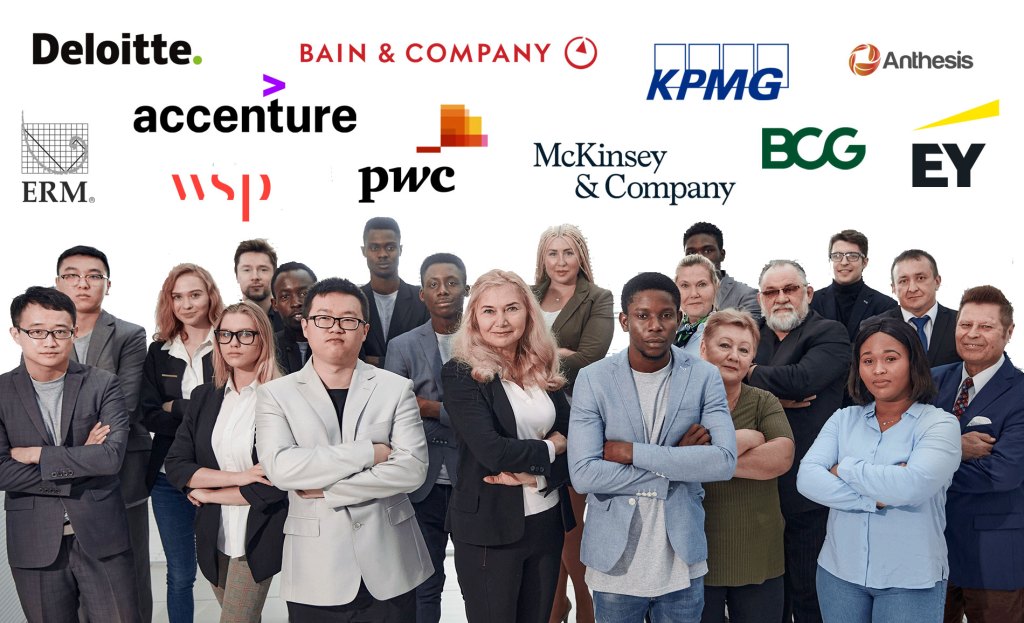Where’s the next generation of sustainability talent? Consulting
Consultancies, large and small, are a superb training ground for your next hire — or maybe your future boss. Read More

GreenBiz photocollage via Shutterstock
Reprinted from GreenBuzz, a free weekly newsletter. Subscribe here.
If you were to recruit a dream corps of young professionals destined to make up the next wave of sustainability champions in business, what qualities would you want them to have?
My wishlist: They’d be diverse. Systems thinkers. Pragmatists. They’d bring analytical skills and a knack for storytelling. Vision, with the patience for process. I’d add a sense of humor (hey, this is my dream corps, after all) and a touch of soulfulness.
Now, if you were to look for this next generation of sustainability professionals in today’s workforce, where would you find them?
I hope your answer is EY, KPMG, Deloitte, PwC, Accenture and their big and small brethren, because that’s where this next generation is currently cutting its teeth: consultancies.
“Big consulting firms hire tens of thousands of people every year, early in their careers,” Bruno Sarda, a Principal, Climate Change & Sustainability Services, at EY, told me. “It’s an existential need to invest in their onboarding and development to ensure they can quickly ramp up and deliver quality work.”
Analyze this
As corporate climate action has grown and investor pressure has increased, companies have sought expertise in developing increasingly specialized analyses and standardized, third-party-assurable data, stat. In-house sustainability teams often look to outside consultants to pitch in on these labor-intensive chores. According to GreenBiz’s 2022 State of the Profession report, 35 percent of companies reported adding consultant resources in 2021.
The consultancies, in turn, have staffed up with grads who can help clients decode not only SASB and TCFD, but also TNFD, GFANZ, CSRD and so on, Ellen Weinreb, CEO of Weinreb Group, an executive search firm focused on sustainability and corporate social responsibility careers, told me recently. That makes them desirable potential employees to a broad range of companies, if and when they decide to exit consulting.
Professional services firms seeking ESG and sustainability talent benefit from the now-hundreds of sustainability-focused undergraduate and grad programs, and Sarda notes they also hire from such academic majors as policy or analytics “with a decent amount of ESG infused into it,” as well as business majors with sustainability minors.
Weinreb noted that consultancies look out for candidates that come pre-vetted by EDF Climate Corps and other graduate practicums, as well as GreenBiz’s own Emerging Leaders program. As the field has come to value more specialized knowledge — versus the generalist practitioners who historically comprised in-house sustainability teams — consulting firms continue to be the proving ground for that expertise.
Sarda added: “We hear consistently from young people that the variety you get when you work for a consultancy instead of an in-house job — diversity of sector, geography, team, of personal network,” is unparalleled. “It’s also an opportunity to specialize. We hire people who, for example, are really interested in climate risk modeling, or in TCFD scenarios. You can do one after another of these projects and become an expert.”
The result? Something of a consulting baby boom of well-educated, well-trained young practitioners with increasingly specialized skill sets who — in three or five or 10 years — might be the next hire for an in-house sustainability team (or might be the one hiring you).
Heather Zanoni spent 6.5 years in the Climate Advisory group at KPMG, following three years as a facilities engineering consultant, before becoming senior director, sustainability & ESG at Dick’s Sporting Goods last spring. “My KPMG background? You can’t replicate that level of access.” As she recalled: “I had worked with pushing-100 clients by the time I left. I had conversations about these really big issues across all industries, across the top 1,000 companies in the world.” She now brings the lessons learned from hundreds of projects to bear in her in-house consulting role.
I admit, this all sounds pretty good. (It sounds, in fact, like I should add “billed more than 100 clients” to my dream corps list of qualifications.)
But what of the stereotypes? Of rows of analyst-drones churning out countless pivot tables and PowerPoint slides? Do we fear a class of professionals rewarded in their formative years for productivity and uniformity, and for bringing regimented, unimaginative thinking to a field that demands vision?
“There’s not a lot of value on subject-matter expertise at more junior levels, the thinking being you can solve any problem without fully understanding it if you have a rigorous process,” reflected Wadia Mahzabeen. She was one of our GreenBiz 22 Emerging Leaders and worked as an analyst at Accenture after graduating from Johns Hopkins University with a bachelors in chemical and biomolecular engineering in 2018. Mild criticism aside, she moved on to boutique consultancy Resonance after Accenture, and she doesn’t rule out further consulting as her career progresses. “I developed the ability to juggle different projects and timelines at both firms. You work fast, and you learn to communicate well.”
And all that PowerPoint?
“In its defense,” she said, “being able to think through storytelling and what’s important to your audience is a really good skill.”
Note to self: Add PowerPoint to the dream corps wishlist.













